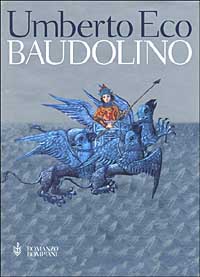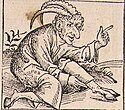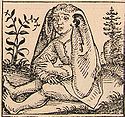Baudolino: Difference between revisions
→Plot summary: Peacock phrase, not that I disagree with it. |
|||
| Line 34: | Line 34: | ||
His story begins in 1155, when Baudolino is sold to and adopted by the emperor [[Frederick I, Holy Roman Emperor|Frederick I]]. At court and on the battlefield, he is educated in reading and writing [[Latin]] and learns about the power struggles and battles of northern [[Italy]] at the time. He is sent to [[Paris]] to become a scholar. |
His story begins in 1155, when Baudolino is sold to and adopted by the emperor [[Frederick I, Holy Roman Emperor|Frederick I]]. At court and on the battlefield, he is educated in reading and writing [[Latin]] and learns about the power struggles and battles of northern [[Italy]] at the time. He is sent to [[Paris]] to become a scholar. |
||
In Paris, he gains friends (such as the [[Archpoet]], Abdul, [[Robert de Boron]], and [[Kyot]], the purported source of [[Wolfram von Eschenbach]]'s ''[[Parzival]]''), and learns about the legendary kingdom of [[Prester John]]. From this event onward, Baudolino dreams of reaching this fabled land. After the death of Frederick, Baudolino and his friends set off on a long journey, encompassing 15 years, to find the Kingdom of Prester John |
In Paris, he gains friends (such as the [[Archpoet]], Abdul, [[Robert de Boron]], and [[Kyot]], the purported source of [[Wolfram von Eschenbach]]'s ''[[Parzival]]''), and learns about the legendary kingdom of [[Prester John]]. From this event onward, Baudolino dreams of reaching this fabled land. After the death of Frederick, Baudolino and his friends set off on a long journey, encompassing 15 years, to find the Kingdom of Prester John. Baudolino meets [[eunuch]]s, [[unicorn]]s, [[Blemmyes]], [[skiapods]], and [[Pygmy (mythology)|pygmies]]. At one point, he falls in love with a female [[satyr]]-like creature who recounts to him the full [[Gnosticism|Gnostic]] creation myth; [[Gnosticism]] is a pervasive presence in another of Eco's novels, ''[[Foucault's Pendulum]]''. Philosophical debates are mixed with comedy, epic adventure and creatures drawn from the strangest medieval bestiaries. |
||
===Characters in ''Baudolino''=== |
===Characters in ''Baudolino''=== |
||
Revision as of 19:43, 18 November 2011
 1st edition (Italian) | |
| Author | Umberto Eco |
|---|---|
| Translator | William Weaver |
| Language | Italian |
| Genre | Historical novel, Speculative fiction |
| Publisher | Bompiani (Italy) Secker & Warburg (UK) Harcourt (USA) |
Publication date | 2000 |
| Publication place | Italy |
Published in English | 15 October 2002 |
| Media type | Print (Hardcover, Paperback) |
| Pages | 528 pp (US hardback edition) |
| ISBN | ISBN 0-15-100690-3 (US hardback edition) Parameter error in {{ISBNT}}: invalid character |
| OCLC | 49002024 |
| 853/.914 21 | |
| LC Class | PQ4865.C6 B3813 2002 |
Baudolino is a 2000 novel by Umberto Eco about the adventures of a young man named Baudolino in the known and mythical Christian world of the 12th century.
Baudolino was translated into English in 2001 by William Weaver. The novel presented a number of particular difficulties in translation, not the least of which is that there are ten or so pages written in a made-up language that is a mixture of Latin, medieval Italian, and other languages.
Plot summary
In the year of 1204, Baudolino of Alessandria enters Constantinople, unaware of the Fourth Crusade that has thrown the city into chaos. In the confusion he meets Niketas Choniates and saves his life. Niketas is amazed by his language genius, speaking many languages he has never heard, and on the question: if he is not part of the crusade, who is he? Baudolino begins to recount his life story to Niketas.
His story begins in 1155, when Baudolino is sold to and adopted by the emperor Frederick I. At court and on the battlefield, he is educated in reading and writing Latin and learns about the power struggles and battles of northern Italy at the time. He is sent to Paris to become a scholar.
In Paris, he gains friends (such as the Archpoet, Abdul, Robert de Boron, and Kyot, the purported source of Wolfram von Eschenbach's Parzival), and learns about the legendary kingdom of Prester John. From this event onward, Baudolino dreams of reaching this fabled land. After the death of Frederick, Baudolino and his friends set off on a long journey, encompassing 15 years, to find the Kingdom of Prester John. Baudolino meets eunuchs, unicorns, Blemmyes, skiapods, and pygmies. At one point, he falls in love with a female satyr-like creature who recounts to him the full Gnostic creation myth; Gnosticism is a pervasive presence in another of Eco's novels, Foucault's Pendulum. Philosophical debates are mixed with comedy, epic adventure and creatures drawn from the strangest medieval bestiaries.
Characters in Baudolino
 |
 |
 |
 |
| Various strange characters figuring in the novel as rendered in the Nuremberg Chronicles. These creatures and many others were all described and named by Pliny the Elder in his Naturalis Historiæ from 77 AD: A monopod and a satyr (top); a blemmyae and a panotti (above). | |
- Invented by Eco
- Baudolino – young man of Alessandria, protagonist, apparently a reference to the patron saint.
- The monopod 'Gavagai', a reference to Quine's example of indeterminacy of translation.
- The putative successors of Hypatia of Alexandria
- Deacon John, leprous sub-ruler of Pndapetzim
- Other fictional or legendary beings
- Kyot
- Gagliaudo Aulari, legendary saviour of Alessandria, and his wife, who are Baudolino's biological parents
- Prester John
- Satyrs
- Blemmyes
- Panotti
- Historical
- Frederick Barbarossa
- Niketas Choniates
- Robert de Boron
- Rainald of Dassel
- The Old Man of the Mountain
- Pope Alexander III
- Beatrice, Countess of Burgundy
- The Archpoet (unknown except through his poetry)
- Otto of Freising
- A member of the ancient Ardzruni noble clan
- Andronicus I Comnenus
- Stephen Hagiochristophorites
- the Venerable Bede
Release details
- 2000, Italy, Bompiani (ISBN 88-452-4736-8), Pub date ? ? 2000, hardback (First edition, Italian)
- 2001, Brazil, Editora Record (ISBN 85-01-06026-7), Pub date ? ? 2001, paperback (Portuguese edition)
- 2002, UK, Secker & Warburg (ISBN 0-436-27603-8), Pub date 15 October 2002, hardback
- 2002, USA, Harcourt (ISBN 0-15-100690-3), Pub date 15 October 2002, hardcover
- 2002, France, Grasset and Fasquelle (ISBN 2-246-61501-1), Pub date 12 February 2002, paperback (French edition)
- 2002, USA, Recorded Books (ISBN 1-4025-2814-0), Pub date ? October 2002, audiobook (cassette edition)
- 2003, Italy, Fabbri - RCS Libri (ISBN 88-452-5195-0), Pub date ? January 2003, paperback (Italian edition)
- 2003, USA, Harvest Books (ISBN 0-15-602906-5), Pub date 6 October 2003, paperback
